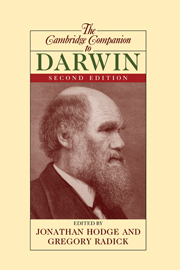Book contents
- Frontmatter
- Introduction
- Part I Darwin’s theorising
- Part II Historical contexts
- Part III Current issues
- 11 From Darwin to today in evolutionary biology
- 12 Metaphysical and epistemological issues in modern Darwinian theory
- 13 Darwinian concepts in the philosophy of mind
- 14 Darwinism in moral philosophy and social theory
- 15 Belief in God in a Darwinian age
- Part IV Philosphical prospects
- Guide to further reading
- List of references
- Index
15 - Belief in God in a Darwinian age
from Part III - Current issues
Published online by Cambridge University Press: 28 May 2009
- Frontmatter
- Introduction
- Part I Darwin’s theorising
- Part II Historical contexts
- Part III Current issues
- 11 From Darwin to today in evolutionary biology
- 12 Metaphysical and epistemological issues in modern Darwinian theory
- 13 Darwinian concepts in the philosophy of mind
- 14 Darwinism in moral philosophy and social theory
- 15 Belief in God in a Darwinian age
- Part IV Philosphical prospects
- Guide to further reading
- List of references
- Index
Summary
Darwinism has long been in the thick of science-religion debates, and never more so than today. Among the latest of a series of American states to legislate in a manner unfriendly to Darwinism is Oklahoma, insisting that science textbooks carry an explicit statement that 'human life was created by one God of the Universe'. Not all religious believers feel so threatened by evolutionary ideas, of course. Pope John Paul II - hardly a man to take doctrine lightly - has sent out a letter endorsing not just evolution per se, but modern theories of organic change. In the same spirit, Keith Ward, Regius Professor of Divinity at Oxford, speaks of natural selection as a 'simple and extremely fruitful theory', and goes on to say that there is 'every reason to think that a scientific evolutionary account and a religious belief in a guiding creative force are not just compatible, but mutually reinforcing'. Nevertheless, even liberal Christians often feel the need to supplement the theory of evolution through natural selection with other special mechanisms. For their part, many of those on the science side of these debates think that Darwinism sounds the death knell for Christianity and other theistic systems. Writing with the passion of Savonarola, the well-known Darwinian Richard Dawkins (author of The Selfish Gene) regrets that a 'cowardly flabbiness of the intellect afflicts otherwise rational people confronted with long-established religions'.
- Type
- Chapter
- Information
- The Cambridge Companion to Darwin , pp. 368 - 390Publisher: Cambridge University PressPrint publication year: 2009
- 3
- Cited by



